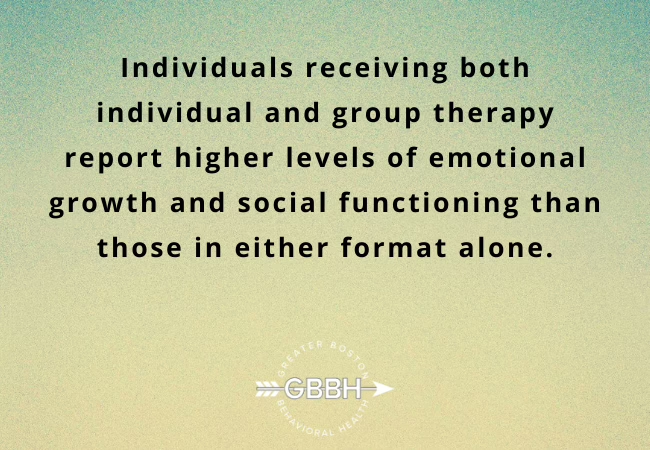When seeking mental health support, most people are familiar with individual therapy—one-on-one sessions with a licensed therapist. But group therapy is just as essential, especially when used in structured programs like IOP and PHP. Together, these therapeutic approaches form the foundation of effective mental health care.
At Greater Boston Behavioral Health, we integrate both individual and group therapy across all levels of care—from weekly outpatient sessions to our Partial Hospitalization Program in Boston and Residential Treatment Program in Boston. Each plays a unique role in helping clients understand their challenges, develop coping strategies, and connect with themselves and others in meaningful ways.
In this blog, we’ll explore how individual and group therapy work, why they’re used together, and what you can expect from each during treatment.
What Is Individual Therapy?
Individual therapy (also known as one-on-one counseling) involves meeting privately with a licensed therapist to work through personal challenges, emotional concerns, and behavioral patterns. This format offers a confidential, supportive space to explore:
- Anxiety, depression, or trauma
- Self-esteem or identity issues
- Stress management and burnout
- Relationship struggles
- Anger issues or emotional regulation
At Greater Boston Behavioral Health, individual therapy is a core part of all our Mental Health Programs in Boston, from outpatient therapy to Intensive Outpatient Programs (IOP) and Inpatient Treatment Programs in Boston.
Our clinicians are trained in:
- Cognitive Behavioral Therapy Boston (CBT)
- Dialectical Behavior Therapy in Boston (DBT)
- Trauma-informed care
- Anger Management Therapy in Boston
- Psychodynamic, solution-focused, and strength-based approaches
Each session is tailored to your diagnosis, goals, and progress, allowing for deep emotional exploration, skill-building, and symptom management.
What Is Group Therapy?
Group therapy involves one or more therapists working with a small group of individuals facing similar issues. Far from just sitting in a circle and talking, group sessions are clinically structured and focus on:
- Interpersonal skill-building
- Emotional expression
- Peer support and feedback
- Accountability and motivation
- Coping strategies and behavioral change
Group therapy is a vital component of our Intensive Outpatient Program in Boston, Partial Hospitalization Program in Boston, and Residential Treatment Program in Boston. It’s also available as a supplement to outpatient therapy for those looking to strengthen their recovery.
Types of group therapy we offer include:
- CBT-based process groups
- DBT skills groups
- Relapse prevention
- Anger management
- Trauma and grief support groups
- Communication and relationship skills
The Power of Combining Individual and Group Therapy
While individual therapy provides personalized attention and insight, group therapy offers connection and shared healing. When used together, they offer a more complete treatment experience by addressing both internal and interpersonal aspects of recovery.
Here’s how they work together:
- Self-Discovery in Private, Application in Group
Individual therapy helps you reflect on personal struggles. Group therapy allows you to practice what you’ve learned in real-life interactions with others. - Validation and Perspective
In group settings, you realize you’re not alone in your struggles. Hearing others’ stories reduces shame and increases emotional resilience. - Reinforced Learning
A skill introduced in individual therapy—like thought reframing or distress tolerance—can be reinforced and practiced during group sessions. - Enhanced Motivation
Peer support in group therapy can boost commitment to goals set in individual sessions.
At Greater Boston Behavioral Health, both formats are integrated into our Mental Health Programs to provide consistent progress, support, and transformation.
Which Mental Health Conditions Benefit from Both?
Combining individual and group therapy is especially effective for:
- Anxiety and panic disorders
- Depression and mood instability
- Post-traumatic stress disorder (PTSD)
- Personality disorders (e.g., BPD)
- Substance use and dual diagnosis
- Anger and emotional dysregulation
Whether you’re in need of deeper trauma processing, enhanced social skills, or relapse prevention, this dual approach offers comprehensive, compassionate care.
How Therapy Types Align with Different Levels of Care
The balance between individual and group therapy varies depending on the level of mental health care a person needs. At Greater Boston Behavioral Health, we tailor the ratio of individual-to-group therapy based on treatment intensity:
In Outpatient Therapy:
-
1:1 sessions are primary, usually once a week
-
Group therapy may be optional for added support
In IOP (Intensive Outpatient Program):
-
Group therapy is held 3–5 times per week
-
Individual therapy typically occurs 1–2 times per week
-
Focus is on skill-building, symptom reduction, and daily functioning
In PHP (Partial Hospitalization Program):
-
Group sessions take place multiple times daily
-
Individual therapy occurs several times a week
-
Designed for stabilization and deep therapeutic work
In Residential or Inpatient Care:
-
Group therapy is offered daily or more
-
Individual therapy is intensive and often supported by psychiatric care
-
Offers immersive treatment for trauma, dual diagnosis, or crisis
This integrated approach ensures that each client receives individualized insight and shared support no matter where they are in their healing process.
Common Misconceptions About Group Therapy—Debunked
Many people hesitate to participate in group therapy due to myths or misconceptions. Here’s what we often hear—and the reality:
“I’ll have to share everything in front of strangers.”
Truth: You control what you share. Therapists foster a safe space and no one is forced to talk.
“Group therapy isn’t as effective as individual counseling.”
Truth: Research shows group therapy is equally effective—and uniquely helpful for developing social skills and gaining feedback.
“People will judge me.”
Truth: Group members often express empathy and understanding, creating a sense of belonging that reduces isolation and stigma.
“It’s just people venting.”
Truth: At Greater Boston Behavioral Health, our groups are clinically guided and goal-oriented, not free-form discussions.
By embracing both group and individual therapy, clients receive the full benefit of emotional exploration and real-world application.
What to Expect at Greater Boston Behavioral Health
In all of our programs—from outpatient to residential—we provide a personalized blend of therapies based on your needs. Here’s what you can expect:
In Our Outpatient Therapy Services:
- Weekly individual therapy
- Optional group therapy or psychoeducation workshops
- Skill-building using CBT and DBT principles
In Our IOP and PHP:
- Daily group therapy sessions (CBT, DBT, trauma-focused)
- 1–2 individual therapy sessions per week
- Psychiatric evaluations and medication management
- Family support and education
- Progress tracking and collaborative care planning
In Our Inpatient or Residential Programs:
- 24/7 clinical support and structured routines
- Daily group and individual therapy
- Holistic and wellness-based group activities
- Step-down planning to PHP or IOP
Our licensed team works together across disciplines—therapy, psychiatry, nursing, and case management—to ensure seamless, coordinated treatment that supports healing on every level.
Why Choose Greater Boston Behavioral Health?
When it comes to mental health treatment, how care is delivered matters just as much as what is delivered. That’s why clients trust Greater Boston Behavioral Health for:
- Comprehensive programs for every stage of healing
- Licensed professionals specializing in CBT, DBT, trauma, and psychiatric care
- Flexible levels of care including outpatient, IOP, PHP, inpatient, and residential
- Integrated individual and group therapy across all services
- Culturally sensitive, trauma-informed, and inclusive care
Whether you’re navigating anxiety, depression, trauma, or emotional instability, we tailor your treatment plan to reflect your goals, your pace, and your life.
Conclusion
Mental health recovery is never a solo journey—it’s a process that blends inner exploration and shared experience. That’s why the most effective programs don’t ask you to choose between individual or group therapy. They give you both.
At Greater Boston Behavioral Health, we combine private, one-on-one sessions with expertly facilitated groups to ensure you’re supported as a whole person—emotionally, socially, and mentally. If you’re ready to heal with a team that understands the power of both personal and peer-based growth, we’re here to help. Call (888) 278-0716 to take the next step toward clarity, connection, and lasting recovery.
FAQ on Individual and Group Therapy in Mental Health Programs
What is the difference between individual and group therapy?
Individual therapy provides one-on-one support with a therapist to explore personal issues, while group therapy involves structured sessions with peers guided by a clinician.
Do I have to choose between individual or group therapy?
Not at Greater Boston Behavioral Health. Most of our programs—like IOP and PHP—integrate both, allowing for personal insight and community-based healing.
Is group therapy effective for anxiety or trauma?
Yes. Group therapy can help individuals feel less alone, practice coping skills, and gain feedback in a safe, supportive environment. It complements trauma work done individually.
What kinds of therapy are used at Greater Boston Behavioral Health?
We offer CBT, DBT, trauma-focused therapy, anger management, and mindfulness techniques in both individual and group formats.
Can I attend group therapy if I’m already in individual counseling?
Absolutely. Group therapy is often used alongside individual therapy to enhance emotional growth, reinforce skills, and promote peer support.


